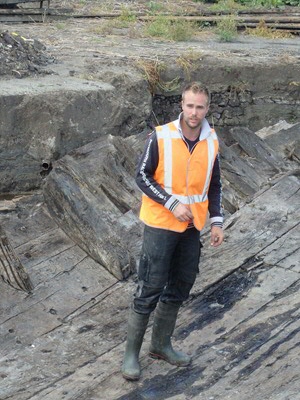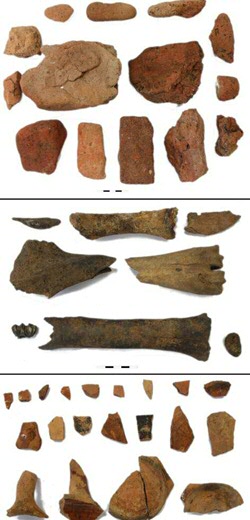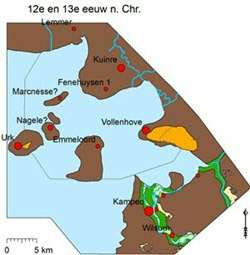Archeologische restanten onthullen geschiedenis Noordoostpolder

De Noordoostpolder herbergt meer sporen van zijn eigen middeleeuwse verleden dan altijd is gedacht. Volgens maritiem archeoloog Yftinus van Popta zijn veel restanten van nederzettingen die in de Zuiderzee verdwenen en later werden gevonden in de akkers van de ingepolderde Noordoostpolder, onterecht aangezien voor onder andere scheepsafval. Van Popta brengt met zijn promotieonderzoek voor het eerst de ontwikkeling van het Noordoostpoldergebied tijdens de late middeleeuwen in kaart. Terwijl Urk en Schokland zich met moeite wisten te verdedigen tegen het water, verdwenen andere nederzettingen in de zee. Van Popta promoveert op 29 oktober aan de Rijksuniversiteit Groningen.
Van Popta reconstrueerde voor zijn promotie het landschap en de bewoning in het noordoostelijke deel van de Zuiderzee (de huidige Noordoostpolder) tussen circa 1100 en 1400. Tot voor kort was er weinig over dit gebied bekend, behalve dan dat het uiteindelijk Zuiderzee zou worden. De focus lag voorheen vooral op scheepswrakken.

Geen scheepsafval, maar restanten van nederzettingen
Uit het onderzoek komt naar voren dat dit gebied tussen 1100 en 1400 veranderde van een onontgonnen en onbewoond veengebied met meren en later ook nederzettingen naar open zee. De eerste bewoners waren boeren. In de dertiende en veertiende eeuw werd de bevolking diverser: vissers, boeren, heren en handelaren. Er resteren weinig sporen van de ontginning, landbewerking en bewoning destijds. Toch is er meer bewaard dan altijd is gedacht, stelt Van Popta. ‘Archeologische resten van bewoning, gevonden in de akkers in de Noordoostpolder, zijn in het verleden onterecht aangezien voor scheepsafval en helaas grotendeels vernietigd door landbouw en herinrichtingsplannen. Daarom is op basis van mijn onderzoek besloten ze vanaf nu te beschermen door ze op te nemen in de archeologische beleidsvoering.’
Urk en Schokland veel groter
Door een samenloop van stormen en vloeden verdween in enkele honderden jaren tijd het meeste land, vertelt Van Popta. ‘Hierdoor verdronken dorpen zoals Nagele, Marcnesse en Veenhuizen, terwijl eilanden zoals Urk en Schokland zich net konden handhaven. Deze eilanden waren ooit vele malen groter dan wat er uiteindelijk van is overgebleven.’ Resten van de verdwenen eilanddelen zijn nog steeds terug te vinden in de voormalige zeebodem. Het gaat daarbij o.a. om dijken, terpen en sloten.

Heden en verleden verbonden
Het is Van Popta gelukt om het landschap en bewoning van de regio in de late middeleeuwen te reconstrueren. Zo komen verdwenen eilanden, verdronken dorpen en door de zee opgeruimd land ineens weer in beeld. Het is daarmee mogelijk om de huidige namen van de Noordoostpolder-dorpen Nagele en Marknesse in verband te brengen met hun laatmiddeleeuwse voorgangers. Waar voorheen altijd werd gedacht dat het maken van een dergelijke reconstructie een nagenoeg onmogelijke opgave zou zijn (de Zuiderzee had immers al het bewijs opgeruimd), blijkt dit juist wél mogelijk te zijn. Het was daarbij belangrijk om vast te stellen dat verstoorde archeologische resten in de polderbodem, zoals aardewerk, dierlijk bot en baksteen, geen 'ruis' of 'afval van schepen' vertegenwoordigen, maar dat het hierbij juist om de allerlaatste resten van verdronken dorpen gaat.
Het onderzoek is gefinancierd door NWO.
Meer nieuws
-
14 februari 2026
Tumor weg, maar waar zijn de woorden?
-
19 januari 2026
Digitalisering drijft kansarme burgers soms in het nauw
